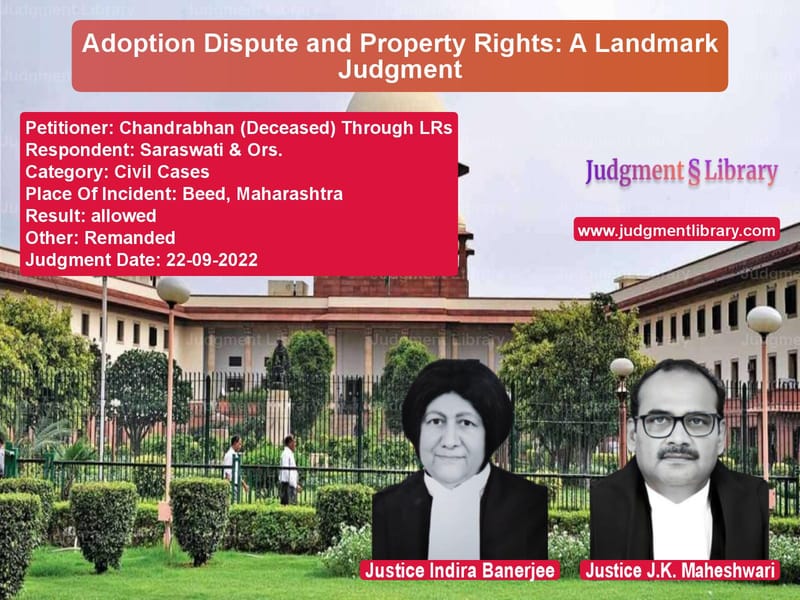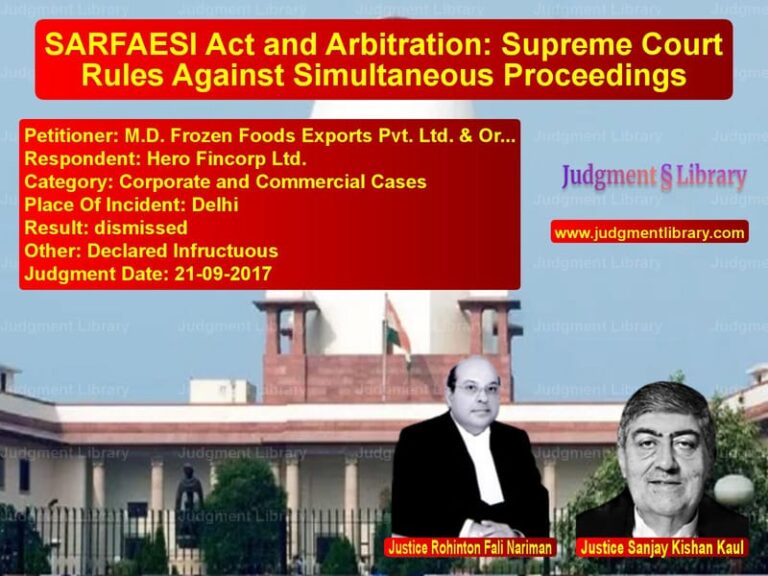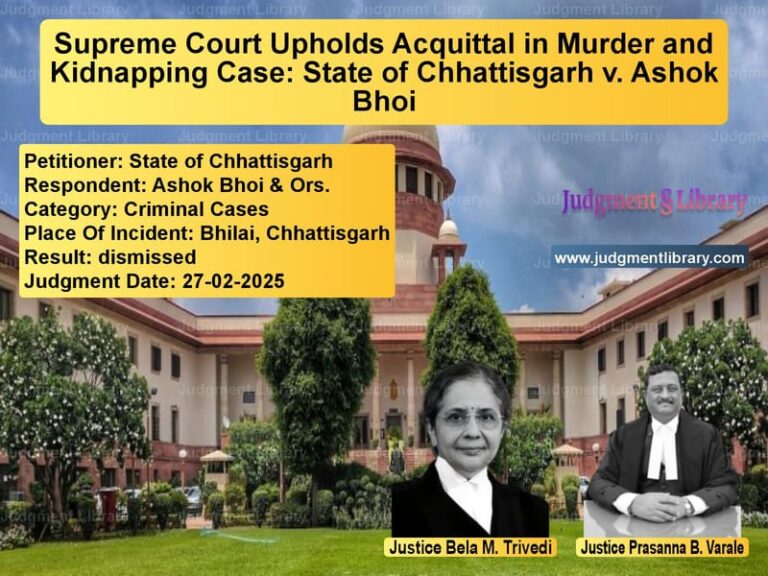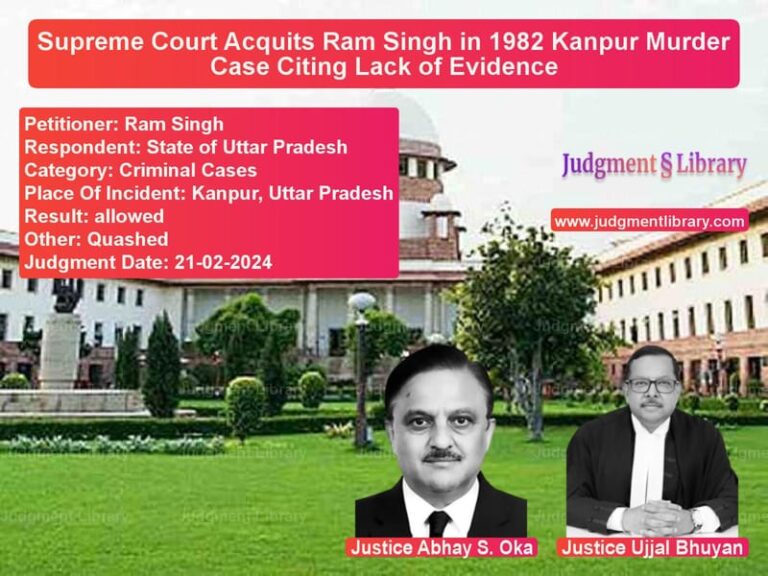Adoption Dispute and Property Rights: A Landmark Judgment
The legal complexities surrounding adoption and property inheritance were at the heart of this case, where the Supreme Court was called upon to decide the legitimacy of an adoption that took place decades ago. The dispute revolved around Chandrabhan, the plaintiff, who claimed to be the adopted son of Baliram and sought ownership rights over the property left behind by his adoptive father. However, the defendants, including his own wife, challenged this claim, leading to a prolonged legal battle that traversed multiple courts.
Background of the Case
The origins of this case date back to the 1950s when Baliram, the elder son of Sambhaji, was childless and purportedly adopted his younger brother’s son, Chandrabhan. This adoption was claimed to have been performed according to traditional rituals and customs, attended by relatives and the community. However, Baliram passed away intestate in 1951, leaving behind his wife, Yamunabai, and substantial property.
After Baliram’s death, Chandrabhan managed the properties but shifted to another village. Years later, in 1979, Yamunabai gifted the disputed properties to Chandrabhan’s first wife, Champabai. This triggered legal action from Chandrabhan, who filed a suit for declaration of ownership and an injunction against the defendants.
Read also: https://judgmentlibrary.com/supreme-court-rules-on-anchorage-and-port-dues-in-mumbai-port-dispute/
Legal Battle Through the Courts
The trial court dismissed Chandrabhan’s suit in 1984, ruling that the adoption was not legally valid. However, on appeal, the Additional District Judge reversed this decision in 1994, recognizing Chandrabhan as the rightful adopted son of Baliram and restoring his property rights. The case then moved to the Bombay High Court (Aurangabad Bench) through a second appeal filed by third-party purchasers who had acquired portions of the disputed property.
In 2016, the High Court overturned the appellate court’s ruling, dismissing Chandrabhan’s claim and setting aside his ownership rights. Dissatisfied, Chandrabhan’s legal representatives approached the Supreme Court, seeking justice and recognition of his adoption.
Arguments by the Petitioner
Chandrabhan’s legal representatives contended that:
- His adoption was conducted in a legitimate and customary manner, with evidence from witnesses, including the family priest who performed the rituals.
- He had been managing Baliram’s properties since the latter’s death, and documents such as revenue records and loan accounts bore his name as ‘Chandrabhan Baliram.’
- His exclusion from inheriting his biological father Rambhau’s property further proved his adoption by Baliram.
- The High Court had erred in interfering with factual findings that had been well established by the first appellate court.
Arguments by the Respondents
The respondents, primarily third-party purchasers, along with Yamunabai and Champabai, argued that:
- There was no documentary proof of the adoption, such as formal registration or legal decrees.
- The alleged adoption ceremony had inconsistencies in the testimonies of witnesses.
- Revenue records initially listed Yamunabai as Baliram’s sole legal heir, contradicting Chandrabhan’s claim.
- The appellate court had overlooked crucial discrepancies and should not have reversed the trial court’s decision.
Supreme Court’s Analysis and Ruling
The Supreme Court meticulously examined the legal questions raised. It noted that under Section 100 of the Civil Procedure Code, a second appeal can only be entertained if there exists a substantial question of law. The Court found that the High Court had exceeded its jurisdiction by re-examining factual matters, which had already been conclusively decided by the appellate court.
Read also: https://judgmentlibrary.com/supreme-court-enhances-compensation-for-land-acquisition-in-haryana/
The Court reaffirmed that adoption cases require clear evidence, but it also acknowledged that minor inconsistencies in witness testimonies do not automatically nullify an adoption claim, particularly when the event occurred decades earlier. Key pieces of evidence favoring Chandrabhan included:
- Testimony from the family priest who conducted the adoption ritual.
- Revenue documents showing his name as ‘Chandrabhan Baliram.’
- His non-claim over his biological father’s property, indicating that he was considered the adopted son of Baliram.
Based on these findings, the Supreme Court ruled in favor of Chandrabhan, setting aside the High Court’s judgment and restoring the decision of the first appellate court, thereby recognizing Chandrabhan as the legal heir to Baliram’s property.
Conclusion
This case underscores the importance of adherence to procedural law in appellate matters. The Supreme Court’s ruling serves as a precedent in disputes involving adoption and property inheritance, reinforcing that second appeals must be confined to substantial legal questions rather than factual re-evaluations.
Petitioner Name: Chandrabhan (Deceased) Through LRs.Respondent Name: Saraswati & Ors..Judgment By: Justice Indira Banerjee, Justice J.K. Maheshwari.Place Of Incident: Beed, Maharashtra.Judgment Date: 22-09-2022.
Don’t miss out on the full details! Download the complete judgment in PDF format below and gain valuable insights instantly!
Download Judgment: chandrabhan-(decease-vs-saraswati-&-ors.-supreme-court-of-india-judgment-dated-22-09-2022.pdf
Directly Download Judgment: Directly download this Judgment
See all petitions in Property Disputes
See all petitions in Succession and Wills
See all petitions in Judgment by Indira Banerjee
See all petitions in Judgment by J.K. Maheshwari
See all petitions in allowed
See all petitions in Remanded
See all petitions in supreme court of India judgments September 2022
See all petitions in 2022 judgments
See all posts in Civil Cases Category
See all allowed petitions in Civil Cases Category
See all Dismissed petitions in Civil Cases Category
See all partially allowed petitions in Civil Cases Category







